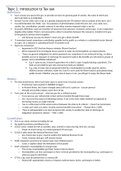Summary
Law of Taxation 411 Entire Coursework Summary (cases + theory)
- Course
- Institution
- Book
An in-depth document covering all of the work done in the course. Includes notes made in class from the slides, from the prescribed textbook & legislation book, & things mentioned by the lecturer as well case law discussions. Set out in an organised manner which makes the subject easy to understand...
[Show more]




